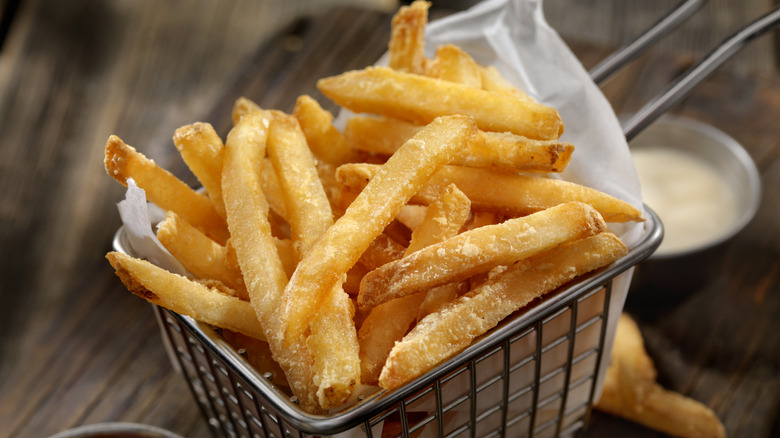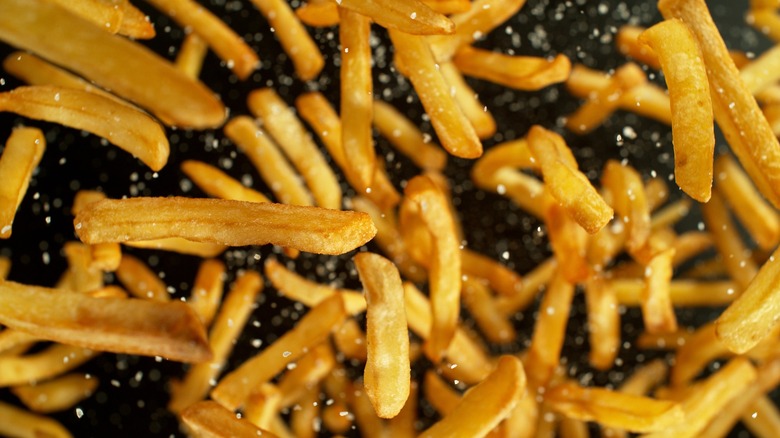The Origin Story Of The Humble French Fry
There's probably no more versatile side dish in all of creation than French fries. No matter how picky an eater someone is, chances are they still enjoy fried potatoes liberally coated in salt. There's a reason they have become so popular worldwide and in seemingly every culture — even if there was that one silly period when people in the U.S. tried to rename them "Freedom Fries."
Still, that begs a question: While it's easy to understand why French fries are so popular now, how did they get that way in the first place? While we don't specifically know the French fry's place of origin (contrary to the name, it may or may not have been France), we do know how they wound up conquering the globe. It starts with European countries spreading them to their colonies and one of the most famous American presidents bringing them from home from France and ends with the U.S. exporting them to much of the rest of the world.
Thomas Jefferson brought them to America
The actual origin of French fries is hard to pin down, and it's the source of heavy arguments between European geographical neighbors France and Belgium. There's some evidence they were invented as a street food in France, but there's no real proof. However, Belgium does have a claim. They were supposedly created as a substitute for fish when the rivers froze over during winter. And Belgians are passionate enough about it to try to get UNESCO heritage status for fries and mayo. Still, there's no hard evidence. Either way, France popularized fries, and they eventually became popular across Europe, with variants included in such dishes as fish and chips in England and currywurst in Germany.
Whichever country invented them, though, there's no dispute about their first appearance in America, which came about thanks to Thomas Jefferson. At some point during his time as American minister to France from 1784 to 1789, Jefferson tried French fries and liked them so much that he brought the recipe home when he came back to America to serve as secretary of state. It may seem strange that an American president brought a classic staple to the U.S. from Europe, but this wasn't even the only instance of Jefferson doing so. He's also responsible for introducing Americans to mac and cheese (although true credit should go to his enslaved chef, James Hemings). Even though Jefferson brought French fries to America, they didn't become an immediate smash hit. That would take roughly a century longer.
The U.S. had a role in making fries a global phenomenon
We're not quite sure when the popularity of French fries exploded in the U.S. The ball started rolling in the 1870s through the 1890s when they started showing up regularly in cookbooks, but they really took off sometime in the early 1900s. On this front, there's debate: Did fries become popular around the turn of the century as some sources claim, or did soldiers in Europe during World War I develop a fondness for them, and bring them home? Whatever the case, they were firmly ensconced in the American consciousness by the mid-20th century when McDonald's made them a core part of their menu.
At this point, French fries were already popular in North America and Europe (and in former colonial possessions, primarily British ones, which is why they're called "chips" in places like South Africa, Kenya, India, and Australia). Today, the most likely explanation for how they became so popular is the rise of global American cultural hegemony post-World War II. One of the key faces of that hegemony has always been McDonald's, which kicked its international expansion efforts into overdrive in the 1970s. This is how you get the rise of French fries in countries that didn't already have them (particularly fry-loving Japan, where they are called "furaido poteto"), marking them as a truly global dish.
Wherever they came from originally, it took a collective effort to bring French fries to the world. Then again, it couldn't have been that much of an uphill climb because who doesn't love French fries?


